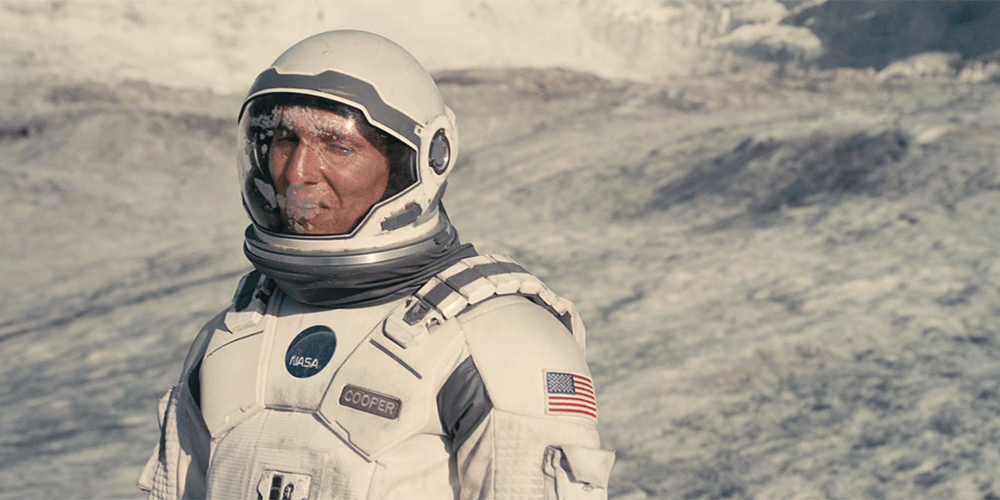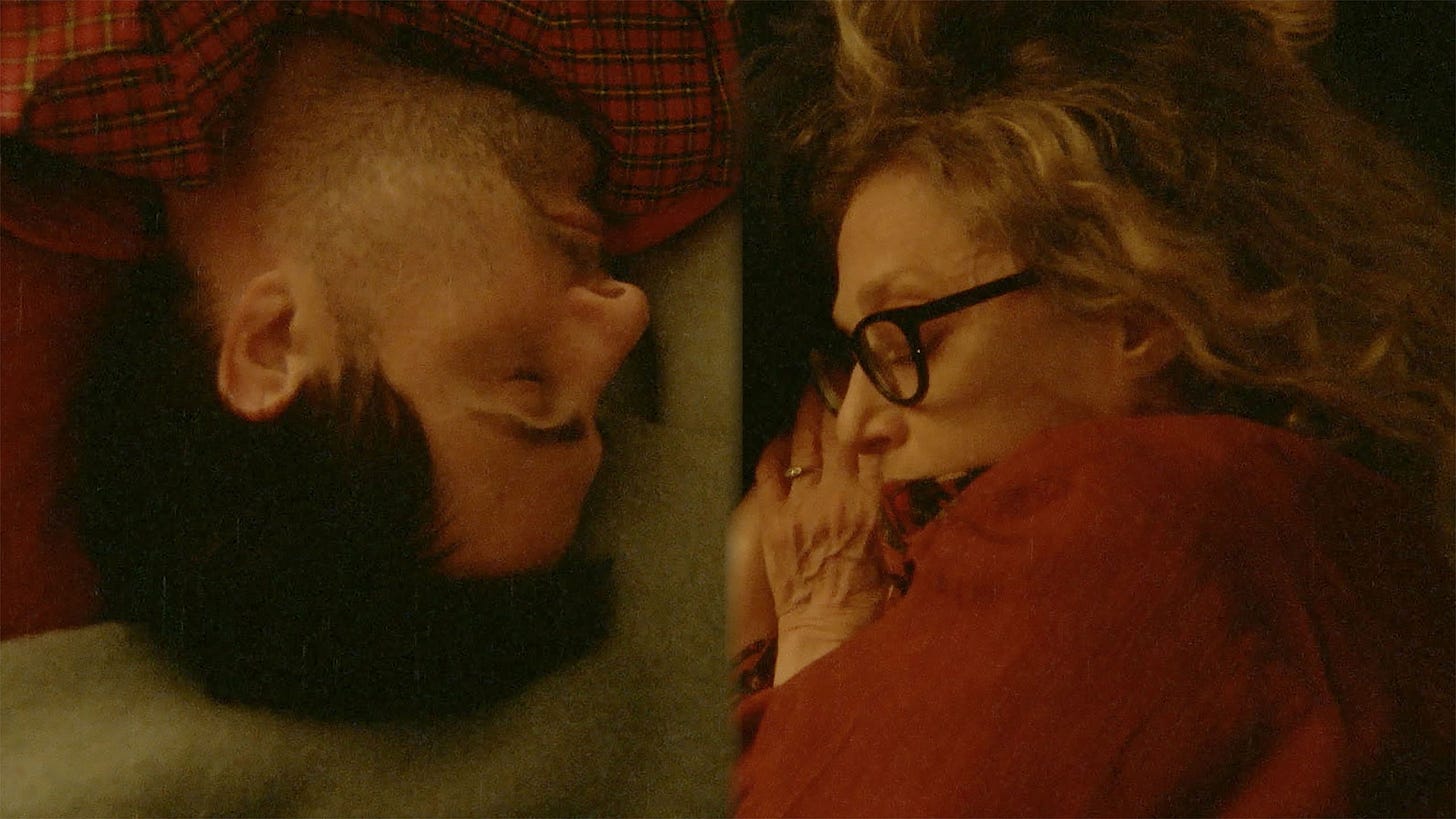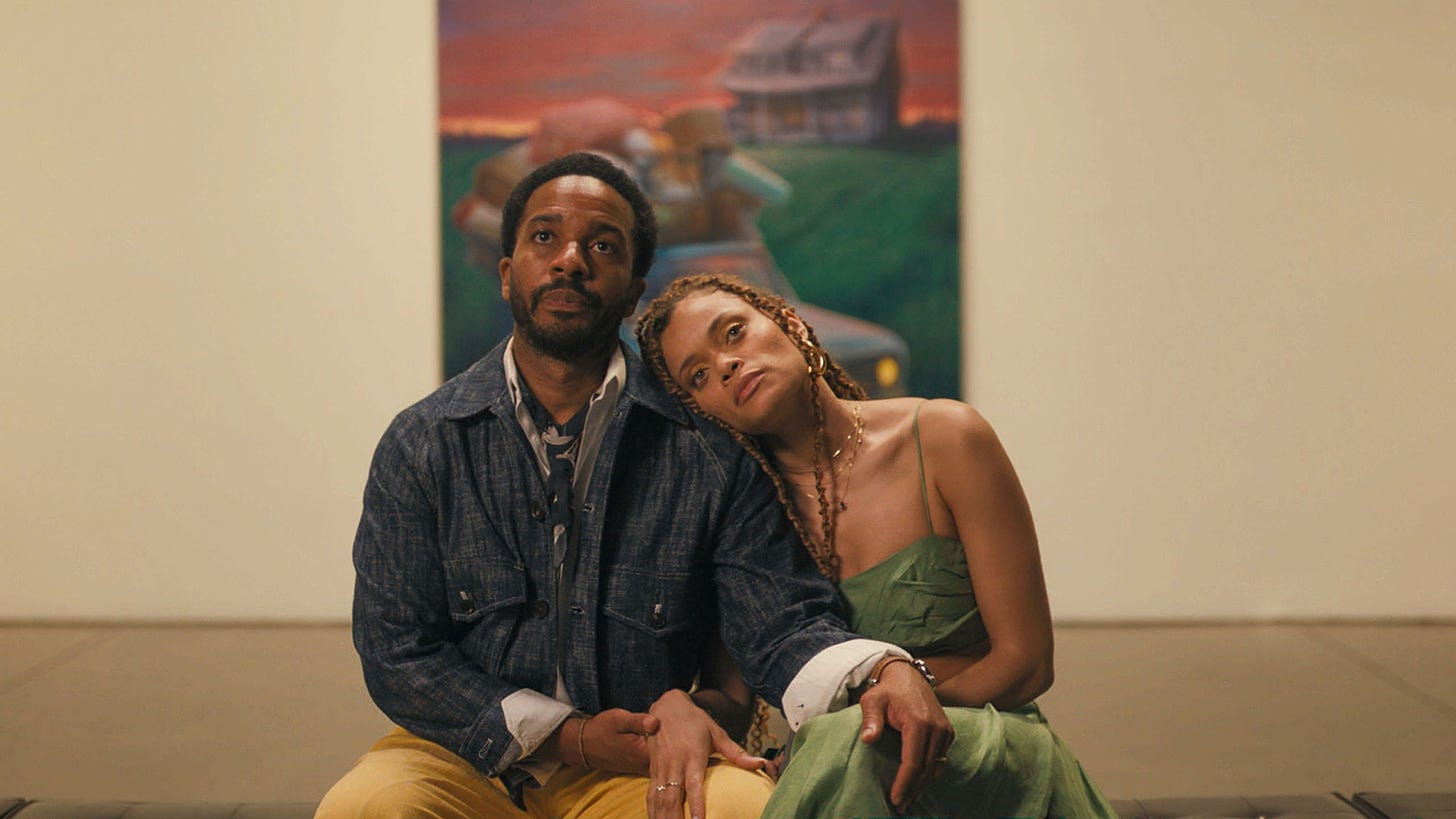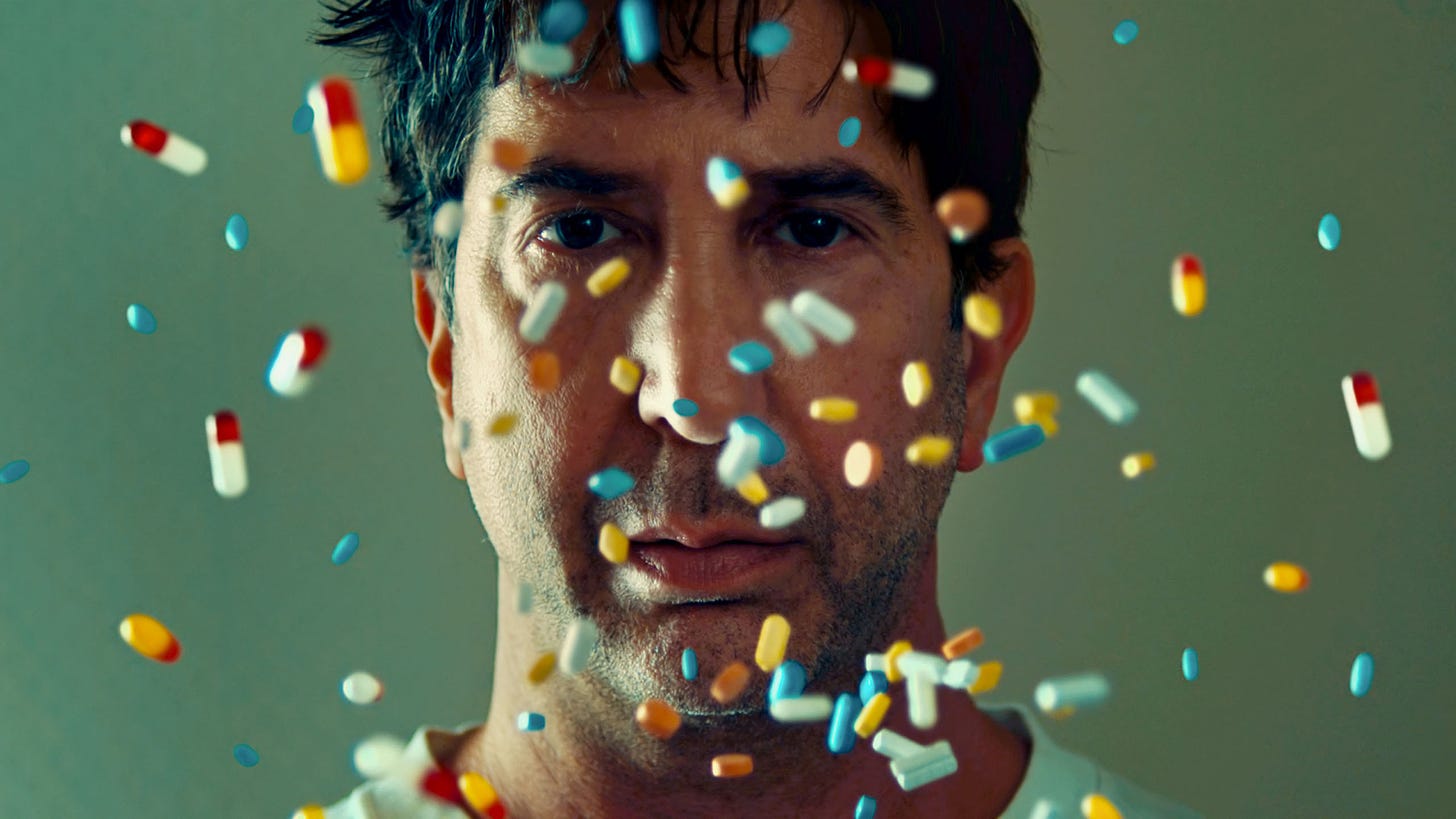I’m still a bit shocked that Sundance hasn’t removed the remote option for their festival yet considering all their other “big name” counterparts shut that door almost as soon as the calendar turned to 2021. They don’t put the whole slate up, it’s a bit steep at $25 a pop, and you only get a four-day window to watch your purchases, but the opportunity itself is really cool considering Park City is not a place I ever see myself hitting to experience the real thing.
Should I have bought five tickets to jam into that four-day window while also being on deadline for Posterized, in the midst of reviewing Oscar shorts, and trying to catch-up on screeners? Definitely not. I’m glad I did, though, since four of those five were good—two were really good and one was great. And I’m honestly not mad I saw the fifth either. It didn’t work for me, but it was well worth the watch.
And with four new releases opening next week in my queue now, it’s starting to look like my attention has fully detached from 2023. There are still a handful I’d love to catch, if possible, but I might get slowed down now that I’ve heard Issa López’s new season of TRUE DETECTIVE might connect to the first. So, I need to finally binge that series before details of NIGHT COUNTRY get completely ruined for me.
What I Watched:
HOW TO HAVE SEX
(in limited release)
The moment from Molly Manning Walker’s excellent feature debut HOW TO HAVE SEX that I can’t get out of my head is the one where Tara (Mia McKenna-Bruce) hears Em (Enva Lewis) from behind a locked door saying she loves her. In a perfect world, Tara would ask her friend to come in and protect her. But this isn’t a perfect world. This is a world where everyone believes Tara doesn’t need protection. A world where they are actually jealous of her for what they think is happening and thus prove too preoccupied to find out if the opposite is true.
So, Tara attempts to make her friend understand without overtly saying anything that might risk angering the man with his arms around her in that locked room. She reciprocates the love and asks her, “Are you okay?” Em answers, “Yes.” because the sexual awakening she’s experienced this trip was consensual. It was everything she dreamt it could be. Then we wait for Em to return the favor regardless of appearances or assumptions. Just ask Tara if she’s okay too. Maybe she’ll answer, “No.” Maybe she won’t. We’ll never know because those words don’t come.
That’s not on Em. Walker isn’t blaming Tara’s friends for staying silent despite their knowing looks that something isn’t right. Walker isn’t blaming Tara either for not quite being able to reconcile what happened to her against what everyone else thinks. The blame lies squarely on the abuser and on society at-large for fostering the climate of sex-fueled peer pressure that allows for such abuse to occur as often as it does with built-in victim-blaming infrastructure. Just search comments from men who have watched this film and see how many freely admit their own monstrousness by coming to his defense with claims he did nothing wrong.
Because, to them, this isn’t “rape” as they define it. That’s why Walker’s film is so important in its authentic depiction of rape as it must be defined. It should be clear as day simply by looking into Tara’s eyes. At her body language. At her micro-expressions of revulsion and recoil. McKenna-Bruce delivers a performance that will break your heart—especially after it happens and she realizes she cannot go back to her hotel room because he might be there and her friends might not understand. She finds another club and new friends instead, vacillating between happy and numb as the incident replays itself throughout every part of her body.
Expressing that duality isn’t easy. Walker and McKenna-Bruce are expertly showing the difference between desire and consent. Yes, Tara wants to lose her virginity. Her goal on this vacation, like Em and Skye (Lara Peake), is to have as much sex as possible. But that doesn’t give permission to anyone and everyone she meets. How Tara acts in the first thirty minutes should not have any bearing on what happens to her during the next hour. Because despite the drinking and dancing and flirting, she makes her intentions with Badger (Shaun Thomas) known. It’s the chaos of hedonism throwing a wrench in those plans that erases the lines of decency and morality for those arriving to pounce.
Thomas demands mention for a devastating performance too. He and Lewis are similar in that Badger and Em are the two people who honestly care about Tara beyond superficiality (Skye loves her friend, but jealousy drives that car). The looks Thomas and Lewis give upon seeing McKenna-Bruce in distress are pained enough to make us hope they’ll intervene. Life just doesn’t always work out that way. Life causes them to question what they’re seeing and to weigh being right against the personal consequences of being wrong.
As the final moment proves, however, the only action Tara truly needs from them is an acknowledgment that they have her back and believe what happened. That they won’t leave her alone this time. Not again.
- 8/10
MR. & MRS. SMITH: Season 1
(streaming on Prime)
You never know what really happens after so much time passes. Was the reboot series of MR. & MRS. SMITH always just created by Donald Glover and Francesca Sloane or was Phoebe Waller-Bridge also on that list before she left for creative differences as an actor? I ask because the latter is a successful writer with a first-look deal at Amazon. Would she have jumped aboard without having some creative control? In the end, it doesn’t matter since Waller-Bridge has no relationship to the show anymore. No writing credit. No producing credit. Pretend that she was never involved at all so you can simply enjoy what did get made.
As a fan of the original film written by Simon Kinberg, I honestly wasn’t sure what to expect. The fact that Glover was involved gave me hope it would tread new ground since he’s not known as an action star. And seeing Francesca Sloane’s name as co-creator with episodes of ATLANTA and FARGO under her belt added even more. Amy Seimetz being attached to direct two episodes was therefore a bonus at that point—just another coup insofar as recruiting interesting people to tackle the retool of a box office success with built-in brand recognition. It was ripe for subversion and this team doesn’t disappoint.
That doesn’t mean it’s a complete subversion, though. We’re still dealing with two covert operatives living together under the same roof—two assassins simultaneously playing house while also going on highly-secretive missions. The difference this time around is that John (Glover) and Jane Smith (Maya Erskine) aren’t in the dark about the other’s “real job.” Rather than work for rival agencies, they conversely work together as partners. Marriage was simply a necessary arrangement for taking the job. We can assume their handler picked them because they might be compatible, but love comes later (think THE AMERICANS). Maybe it’s real. Maybe it’s a product of close proximity and life or death stakes.
This first season unfolds as a way to find out for certain. Episodes are therefore entitled “First Date,” “Second Date,” “Couples Therapy,” etc. for a reason beyond merely the scenario of that given mission. Yes, there is ample drama and tension in the task at-hand, but what really sticks and ultimately carries through all eight chapters is how the events themselves impact this central relationship. How does work bleed into life and vice versa. What happens when the honeymoon period of snuggling and sex makes way for frustration and resentment? We’re talking very close quarters with two very independent people. It’s full trust or nothing.
So, it’s not just sex appeal and flying bullets a la Brad Pitt and Angelina Jolie circa 2005. John and Jane are introverts. He’s a Mama’s Boy. She’s robotic and cold. That which endears them to the other soon becomes exactly what they hate about the other … or is it a mirror that reveals what it is they hate about themselves? Don’t discount anything as a result. Race. Gender. Family history. It all plays a role in building the masks that they wear out in the world and at home as well as the crippling anxieties they cannot avoid. What does the future hold for them professionally and personally? Can those two halves ever be separate?
I think Glover and Sloane do a very effective job asking these questions and beginning to answer them. The goal is multiple seasons, right? You can’t answer them all straight away. You have to tease the evolution of this partnership and the potential fireworks that may result if things go off-the-rails. So, you sprinkle in other people with similar problems. What can the Smiths learn from guest stars like Sharon Horgan and Billy Campbell or Parker Posey and Wagner Moura? How about targets like John Turturro or Ron Perlman? Or a couples therapist who has no clue what she’s getting herself into (Sarah Paulson)? They present examples to learn from, clichés to avoid, and reminders that they’re often their own worst enemy.
With a condensed episode order and fast-tracked trajectory, there’s very little excess throughout. Sometimes that can be a disadvantage when it comes to ensuring every small detail relevant to a later moment is screamed during the episode (and louder during the recap), but I’d rather that than filler episodes spinning wheels or recycling plotlines. Glover and Erskine have a great rapport: chemistry, comedic timing, and an infectious charm that makes you want to pull for them even when things go sideways. The supporting cast is fantastic (I didn’t even mention Paul Dano as “Hot Neighbor”) and the action—once it arrives during the last few episodes as more than tiny snippets—works.
But it all truly lives and dies with the characters. No matter how good the acting, we’re dealing with John and Jane for every minute of every show. If they aren’t captivating and complex on the page, no amount of charisma will compensate. They need flaws. They need walls to guard them from getting hurt. They need to make mistakes. Unlike the film version, these Smiths aren’t pristine models (that distinction is left for the duo who open things up via a prologue that serves as a reminder of the job’s short shelf life). No, they are regular people with trust issues who are embracing a roller coaster of risk to start building a nest egg for incomplete dreams.
- 7/10
STEPPENWOLF
(screened at Rotterdam 2024)
If it were up to Berіk Aitzhanov’s character—a man who demands to never be called by the only name he speaks as being his own—Adіlkhan Yerzhanov’s STEPPENWOLF would be the consummate nihilistic journey through Hell in search of vengeance. Unfortunately for him, however, this is not a journey that he’s able to take alone. Incarcerated for five years, in which he’s made the belief that “good isn’t necessary for life” his mantra, escape comes at the hands of a barely coherent mother in distress (Anna Starchenko’s Tamara). Numb to the chaos of riots and gunplay that she slowly walks through unscathed, she releases Aitzhanov under the promise that he’ll help find her kidnapped son.
It’s a match made in comedic heaven despite the dark and brutal world housing them. He’s a sadistic maniac with zero qualms about torturing or killing whoever crosses his path. She stammers and sleepwalks with nothing but her boy’s name on her lips unless Aitzhanov gets her smiling with childish peek-a-boo games or sharp slaps to the face. Tamara is dead inside with the potential her son has already been torn apart for the organ trade, so Aitzhanov is able to do whatever he wants in front of her as long as he returns to the mission. And since the man who has her child is also the man who killed his own, their missions are one and the same.
I’m not being entirely glib when I mention the comedy. I laughed out loud a few times during STEPPENWOLF and I’m certain Yerzhanov intended for me to do so. That’s how unhinged Aitzhanov’s character and performance are. He’s mocking men as they plead for their lives despite kneeling at gunpoint beside them. He’s playing with his soon-to-be victims like one would play with his food—absentmindedly making them believe they’re safe before boredom takes their last breath without remorse. Because he’s just as dead inside as Tamara; she just still holds onto hope that she’ll be reunited with the person she loves most. She feels fear for him (not for herself) while Aitzhanov fears nothing since he has nothing more to lose.
The resulting blood-soaked western isn’t the fastest paced film you’ll see, but it’s also never uninteresting. Most of that is Aitzhanov delivering an unforgettable antihero who’s unbothered by morality and a script that lets him run wild, but it’s also the intrigue born from the uncertainty about whether Starchenko’s Tamara is unable to gather herself and help physically or emotionally. She starts becoming more lucid the closer they get to their destination (and the more Aitzhanov wakes her with violent impatience), but the threat of losing her to melancholy never disappears. Neither does his psychopathy despite eventually breaking down to tell her (and us) his story.
How far will she go to save her son? How far will he fall to repay the horrors done to him? The answer to both questions is “as far as necessary,” and that means using the other to accomplish their goals. Don’t therefore expect to find them becoming friends or finding vulnerability. Don’t expect them to try and save the other at the expense of their own wellbeing. They’re merely on the same road together rather than together upon that road. If she gets shot, he’ll walk over her corpse and continue forward. If he gets shot, she’ll simply start mumbling about her son to a world of deaf ears again. Their success hinges on fate alone.
- 7/10
SUNDANCE FILM FESTIVAL 2024
BETWEEN THE TEMPLES
U.S. Dramatic Competition - World Premiere
Without ruining the joke, I have to say that the opening scene to Nathan Silver’s BETWEEN THE TEMPLES is a perfect encapsulation of what you can expect from his and C. Mason Wells’ script. The way it asks the audience to make an assumption alongside a character that will inevitably be upended. The way it may upend that assumption again to always keep the awkwardness and humor energized. The way it provides space for the characters to maintain their own perspectives on a single moment despite that perspective being vastly different than the others. It’s so very good.
You almost can’t imagine how the rest of the film will match that prologue because it feels so meticulously constructed as a self-contained gag to introduce its tone and characters, but there’s really zero drop-off afterwards. Some scenes work better than others as some can feel a bit out-of-place (a highly sexualized interaction kind of comes out of nowhere to take you out of the whole despite still proving effective), but the cast is fully on-board and the consequences of those moments always bear fruit. So, you should definitely trust that Silver and company know what they’re doing and that the inherent discomfort on-screen is never a mistake.
We’re dealing with two people at a crossroads of identity. Two generous souls who have lost someone and are at different points in their grief. Ben (Jason Schwartzman) is still numb from his wife’s death. He cannot sing anymore despite being his temple’s cantor and his faith is shaken in a way that has him asking a priest if converting to Catholicism means he might see her again in Heaven. Carla (Carol Kane) is conversely embracing her present. Not because she’s forgotten her husband or because she doesn’t miss him anymore, but because his absence allows her to listen to her own desires—one of which is to have the bat mitzvah her communist parents wouldn’t allow all those years ago.
It’s this desire that reunites the two decades after she taught him music. Carla’s tenacity forces Ben to rediscover what it is about Judaism that can help guide him through his pain while reminding him of the power of art that drew him to his vocation in the first place. And Ben’s desire for life—something he had obviously lost—invigorates Carla to find the bravery (Kane made a distinction between bravery and courageousness during the Q&A) to do this thing she knows her atheist son will think silly or worse. She gave him a voice when he was a child and now, in the process of returning the favor, she’s steering him in the direction to give that voice back to himself.
It’s a very moving story in that respect. The bond that forms between these characters is real regardless of it being undefinable (although everyone around them is quick to label it so that they can subsequently reject it). It’s only made stronger as a result since everyone else is generally more interested in what they want for Ben and Carla rather than listening and acknowledging it’s not a shared desire. Dolly De Leon and Caroline Aaron as Ben’s parents, Matthew Shear as Carla’s son, and Robert Smigel and Madeline Weinstein as Ben’s rabbi and his daughter/Ben’s potential love interest are all wonderful—especially during a Shabbat dinner scene rivaling the anxiety-inducing chaos from THE BEAR’s Christmas.
The world wants Ben and Carla to conform to the idea of who they once were. Not maliciously, but definitely selfishly just the same. Ben’s loved ones think they can fix him by jump-starting his libido. Carla’s family doesn’t think she needs fixing at all. So, it’s no surprise that they find a sense of freedom in each other. A safe place devoid of judgment to be who they want to be even if it might seem absurd on paper. Even if they don’t fully understand the breadth of what this evolution means and are caught in the confusion of how they got there. In each other lies the purity of compassion and inclusion family and religion should supply. Things that money, ego, and entitlement have begun rendering obsolete.
- 7/10
EXHIBITING FORGIVENESS
U.S. Dramatic Competition - World Premiere
Haunted by the traumatic memories of his childhood, a painter (André Holland’s Tarrell) begins the journey to exorcize those demons through his art. Giant canvases are suddenly filled with color to depict the houses and innocence that were left to decay in the past. He gives them form at a moment when he’s ready to officially leave it behind (if his nightmares ever let that be a possibility) by moving his mother (Aunjanue Ellis-Taylor’s Joyce) out of the old neighborhood only to discover it isn’t quite ready to let him go.
Born from an art exhibit of the same name, Titus Kaphar’s EXHIBITING FORGIVENESS serves as a means to process his own emotions and to supply the audience room to acknowledge theirs. He explains that the memories led to writing which led to paintings and then a script. Kaphar tried the documentary route first before finding the unfiltered truth too raw to deliver to the world, so he packaged his story within fiction instead as a way to be vulnerable without being fully naked. Like the canvases themselves, the film becomes a window into his pain and catharsis without sacrificing the distance needed to feel safe or the ability to let the message transcend any specific details.
What Tarrell endured is not therefore the point. The point is that he was forced to endure it. How did that shape who he became? How does fearing its presence within dictate his actions with a wife (Andra Day’s Aisha) and son of his own? Is putting it out into the world as painted vignettes enough to remove the suffering from his mind or might it allow it to rise and fester? And, of course, where’s the line when that anguish you seek to escape becomes a means towards money and/or a false familiarity from outsiders exploiting it for a bought seat at the table of genius? How does someone traverse these nuanced and triggering complexities?
What’s great about Kaphar’s work is that he never flattens the dynamics at play. Yes, Tarrell is our protagonist and must decide what to do when his desire to heal is complicated by the return of his abusive, drug-addict father La’Ronn (a scene-stealing John Earl Jelks), but he doesn’t exist in a vacuum. Just because he doesn’t believe it doesn’t mean La’Ronn hasn’t changed. Nor must Joyce refuse to forgive him just because Tarrell won’t. One person’s feelings shouldn’t cancel another’s or demand a binary result coerced from guilt. Every story has many valid perspectives—even if acknowledging that truth invalidates your hope for reconciliation.
Because forgiveness isn’t owed. It’s earned. And earning it doesn’t mean you’re entitled to a redo. Too often religion and society demand that peace be made reliant upon the victims making room for their aggressors rather than the aggressors working to cease their aggression regardless of whether doing so includes them in the result. This is an important distinction that can ruin the authenticity of a story if it isn’t made. Because trauma doesn’t just disappear. A happy ending isn’t solely about living happily ever after together as much as it is being able to live apart with a shared recognition that excuses (justified or not) can never erase trauma’s impact.
It may seem simple, but there’s so much power in letting that duality exist on-screen. Just because EXHIBITING FORGIVENESS is immaculately constructed with devastatingly honest performances (Holland and Ellis-Taylor are amazing) doesn’t mean the drama it depicts isn’t messy and contradictory and heartbreaking in its characters’ needs to do what’s best for them despite not being what the rest hope. That’s where the difference between effective and transcendent lies—a filmmaker putting truth ahead of convenience in a way that allows the characters to accept the past without fear or denial. It happened and it mattered, but it’s no longer in control.
- 9/10
GOOD ONE
U.S. Dramatic Competition - World Premiere
The thing that strikes me most about India Donaldson’s GOOD ONE is just how effective the script is at building towards its final act of rebellion. Because we don’t assume one will come at the start. Sam (Lily Collias) isn’t being dragged onto this camping trip against her will. She genuinely seems excited to go even if that excitement is more about the routine and tradition behind the excursion than the excursion itself. Her presence is therefore more as an observer than doer. A passive vantage point into the more active drama unfolding between her father (James Le Gros’s Chris) and his long-time friend (Danny McCarthy’s Matt).
As such, we’re seeing what she sees. Their avoidance through sarcasm. Their inability to recognize vulnerability or discomfort. Their frustrated silence born from a refusal to admit wrongdoing. And, of course, the ways they use Sam as a weapon against the other—with and without intent. The first two-thirds is thus a potent look at the ways in which toxic masculinity affects the lives of men who may not superficially seem or act like your prototypical toxic male. These are fathers who love their kids, but also flawed men alternating between self-pity and self-righteousness when it comes to acknowledging complicity.
Then comes the moment you feared but began to think wouldn’t. This is where Donaldson excels because she’s shifting the dynamic without needing to shift the perspective. We’re still watching events unfold from Sam’s eyes, but those eyes are no longer able to quietly observe. Sam can no longer worry about hurting these men’s feelings at the expense of her own, knowingly chastising and/or comforting one or the other when they inevitably attack with seemingly innocuous language that cuts deep due to the context of their inherent lines of comparison. Suddenly Sam is brought into their pity party in a way that demands a response.
It’s a subtle yet powerful transition that recolors everything in the lead-up by revealing the circumstances surrounding Sam’s passivity and role as referee. This was supposed to be a foursome with Matt’s son joining, but he doesn’t come as a consequence of his parents’ recent divorce—one whose fault lies at Matt’s feet. Sam went through the same experience herself, so she understands that emotional tumult in the face of uncertainty. She knows what it’s like to blame her parents for uprooting her life as well as the toll it takes on them as they deal with their regrets through a mixture of contrition and indignity.
Collias’s nuanced performance is the linchpin as a result because she’s caught in the middle regardless of her desire to be forced into that position. She understands Matt’s pain and questions Chris’s indifference to it, calling out the latter’s own mistakes as a means to remind him of his hypocrisy. Is she therefore choosing sides? No. She’s simply pointing out that both men share a side, one that demands remorse rather than superiority. And with their struggle to admit that arrives a problematic banter that cannot help spilling over into the sort of rhetoric that cannot and should not be taken lightly.
And therein lies the potency of the title: GOOD ONE. Yes, it’s about Sam being a “good” child opposite Matt’s “bad one.” But it’s also gendered. She’s a “good one” for being a lesbian and thus not making Chris have to worry about boys. She’s a “good one” as in not being vindictive like both men see their ex-wives to avoid shouldering any guilt themselves. She’s a “good one” because she doesn’t talk back or cause a scene. But she’s no longer a child. She no longer has to work so hard to keep the peace for her own sake. So, the moment being the “good one” today becomes allowing them to be bad is the moment she finally sheds that role.
They made their beds and it’s no longer (nor should it ever have been) her job to fix the sheets before it’s time to lie in them.
- 8/10
HANDLING THE UNDEAD [Håndtering av udøde]
World Cinema Dramatic Competition - World Premiere
Novelist John Ajvide Lindqvist definitely has a vibe. I’ve never read one of his stories, but the atmosphere and tone wielded by director Thea Hvistendahl on her debut feature HANDLING THE UNDEAD is nothing if not very in-line with the author’s previous cinematic adaptations LET THE RIGHT ONE IN and BORDER (all great). The weight of every scene and the deliberate pacing to allow the actors room to emote without words is so particular. Add slow-pan cinematography and the sense of unease matches the grief filling each room to capacity.
These characters aren’t in a good mental state to start, so what transpires can only risk breaking them further via the false hope of a horror premise treated with the humanity and care these things often lack in lieu of graphic gore. Anna (Renate Reinsve) recently lost her young son and cannot cope with her father’s (Bjørn Sundquist’s Mahler) attempts to console her. Tora (Bente Børsum) has just said goodbye to her love (Olga Damani’s Elisabet) before returning home and taking the phone off the hook. And David (Anders Danielsen Lie) is soon to find his own life shattered before potentially being saved in an instant.
None of them are the “lead.” None demand more investment or empathy than the other. They’re simply variations on our collective human desire to have one more moment with loved ones who have died. The focus of the film is thus the world they inhabit instead: a seemingly normal Norway full of longing and anguish that is given a gift in the form of a nightmare. Because once the static on the radio amplifies towards a city-wide power outage, the unthinkable begins to occur. And rather than just unleash zombies upon the population, Hvistendahl and Lindqvist facilitate reunions. Anna and her boy. Tora and her love. David and his wife.
And that’s where the real unsettling nature comes in. Not just from the ways in which these corpses are reanimated as silent approximations of their former selves in varying levels of physical and/or aesthetic stress, but also in the sense that the audience knows what this scenario ultimately births. We know that the other shoe will eventually drop whether by those whom these characters are holding onto too tightly, strangers popping out of hospital beds and graves with no one to embrace, or the mistakes made from their own clouded judgment. It’s not therefore a case of “if.” It’s a case of “when.”
Hvistendahl never falls prey to the desire for easy thrills or gruesome extremes. There are some very disturbing moments towards the end of HANDLING THE UNDEAD, but nothing that doesn’t feel authentic in its additional expression of love. Because that’s what motivates everyone on-screen. Not reason or fear. These characters are so distraught that they will allow an illusion to guide them to their own demise before considering the person they’re protecting isn’t the person they so desperately need. It leads to tragedy. Painful recognition. And, in some cases, catharsis. It reminds us to live for the dead and not simply die with them.
- 8/10
LITTLE DEATH
Next Program - World Premiere
Kudos to Gaby Hoffmann during the Q&A for getting me to consider that there is meaning to the scattershot, dual narrative that is Jack Begert’s LITTLE DEATH. When asked about what she saw in the script and about her process playing a role that was also being played by someone else, she mentions how the material’s biggest draw to her was its inherent sense of confusion. That the characters were confused as much as the narrative itself. Her putting intent on that feeling did somewhat change my impression of the whole. Not enough to recommend it, but enough to respect its attempt.
Because even if these people are confused in our current chaotic times, they don’t have to regurgitate every obvious political and cultural taboo ad nauseam to prove it. More than the AI artwork (I really hated it—worse once a character talks about it later in the film), it was the simplistic nature of using these roles as bullhorns for the most unoriginal mindsets that frustrated me. The conversations that happen in the first half surrounding our presumed lead Martin (David Schwimmer) could have been cribbed from any random Twitter rant that refuses to acknowledge how screaming louder doesn’t suddenly help manifest a point.
Begert and co-writer Dani Goffstein aren’t therefore saying much. They’re just putting stereotypical words into the mouths of stereotypes without the intrigue or complexity necessary to look past the obnoxiousness of it all. The dialogue is so pointed and didactic that it sheds all meaning the moment it’s spoken. Because as Jena Malone’s Jessica states, “It’s not like you’re curing cancer.” Martin agrees he’s just cashing a paycheck, but that this new script is important (it’s not). Add his pills and her bowling (the addiction she uses to replace food after losing weight) and it’s an uninspired circle en route to Angela Sarafyan—a plot device/distraction whose involvement is mostly for a last-second Easter egg punchline.
Thankfully, the second half is much better. Maybe it’s the lack of AI rendering the first into a weird curio of artificiality keeping us at arm’s length, but I’d like to believe it’s because Karla (Talia Ryder) and AJ (Dominic Fike) are simply written as real people and not caricatures. I think the film should have used parallel trajectories rather than a full-stop shift in focus that makes both halves feel incomplete (only Sante Bentivoglio’s drug dealing pharmacist carries over—which is great since he’s easily the best part of the whole), but at least we move from hollow to poignant and not the other way around.
That’s not to say Karla and AJ’s desperation isn’t without its own issues, they just aren’t so glaring. Because despite falling into their lives midstream, we actually get to know who they are and what their history is in a lot more detail than Martin and Jessica. Probably because they are closer to who Begert is and the people he knows. There’s an authenticity to their tragic story whereas the creative bankruptcy of Hollywood is more a gag based upon hyperbolic exaggeration. And maybe that’s why I hated the AI as much as I did. Begert treats Martin’s “art” as a similar mode of hackery that can be manipulated for profit and thus possesses zero impact.
In some respects: yes, the industry is like that. But that industry is where you’re currently making your own film. You’re also exploiting what you think the audience wants, skewering wokeness in one scene and centering inclusion in the next. Too much of LITTLE DEATH feels like having your cake and eating it too, leaving all the good aspects to be canceled by the bad ones so the audience is left with nothing but a shallow promise and wasted potential. I only hope that those good parts are what Begert ultimately carries forward. That this is a debut jumble of ideas clearing the path for a more cohesive and memorable follow-up.
- 4/10
Cinematic F-Bombs:
This weekend sees AMERICAN SYMPHONY (2023), CRITTERS (1986), EVERYONE SAYS I LOVE YOU (1996), GHOULIES II (1987), and INTERSTELLAR (2014) getting added to the archive (cinematicfbombs.com on Sunday, Twitter on Monday).

New Releases This Week:
(Review links where applicable)
Opening Buffalo-area theaters 2/2/24 -
AMBAJIPETA MARRIAGE BAND at Regal Elmwood & Transit
ARGYLLE at Dipson McKinley, Flix & Capitol; AMC Maple Ridge & Market Arcade; Regal Elmwood, Transit, Galleria & Quaker
HUBBA at Regal Transit
JUNGLE BUNCH: OPERATION MELTDOWN at Dipson Flix & Capitol; Regal Galleria & Quaker
KISMATH at Regal Elmwood
SCRAMBLED at Dipson Flix & Capitol; AMC Maple Ridge; Regal Elmwood, Transit, Galleria & Quaker
Streaming from 2/2/24 -
BOSCO – Peacock on 2/2
DARIO ARGENTO PANICO – Shudder on 2/2
ORION AND THE DARK – Netflix on 2/2
THE TIGER’S APPRENTICE – Paramount+ on 2/2
THEY CALLED HIM MOSTLY HARMLESS – Max on 2/8
Now on VOD/Digital HD -
SUZUME (1/30)
“The result is a gorgeous and emotionally heavy tale of longing and understanding. The humor of a talking chair and heartache of trauma combine to entertain and enlighten en route to a climax as personal to Suzume as it is universal to mankind.” – Full thoughts at HHYS.
WONKA (1/30)
CALAMITY JANE (2/2)
DEPARTING SENIORS (2/2)














